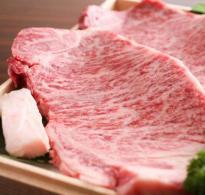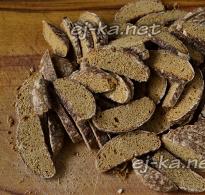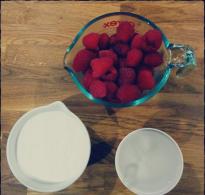Bergamot - the benefits and harm of a citrus plant. Bergamot - what kind of plant is it, photo, how it is added to tea
The benefits and harms of tea with bergamot is a question that many connoisseurs of classic tea ask. Bergamot drink is considered very healthy, but at the same time there are many myths associated with it, and it is interesting to understand its real properties.
What is bergamot
Not everyone knows that bergamot is not herb, but a citrus plant bred artificially. To obtain it, breeders crossed orange and citron - and got a fruit that combines their properties.
The bergamot tree grows mainly in the Mediterranean, Italy, and some regions of America. Bergamot can reach a height of 10 m, the branches are covered with thorns, and the tree blooms with beautiful reddish or white flowers with a pleasant aroma.
Bergamot fruits are similar to both lemons and limes - they are round and covered with a thick peel. The pulp of the fruit has a sour-bitter taste, but the value of bergamot lies not in it, but in the peel of the fruit - and in the flowers and leaves of the plant. The peel is used to prepare healthy and aromatic essential oil, along with dried leaves and flowers, it is added to black and green Chinese, Indian, and Ceylon teas to increase the benefits and enhance the taste.
The history of the origin of tea with bergamot
The birthplace of the bergamot plant is considered to be the Italian town of Bergamo, after which the fruit got its name. But many legends are associated with bergamot tea and its spread throughout Europe. But they all, one way or another, claim that tea first came from China to England - and from there it came to other countries.
The most popular legend says that in the 19th century, the Englishman Earl Gray saved a young Chinese nobleman from certain death. The young man's father, in gratitude, presented the count with an unusual fragrant tea. Gray liked the drink, and he contributed to its spread in England, and the tea has since been called “Earl Grey.”
Chemical composition and calorie content of bergamot tea
Currently, bergamot tea comes not only black, but also green and white. However, the drink always contains the following substances:

- vitamins C, B2, B1, P and PP;
- aldehyde citral;
- monoterpene camphene;
- linalool;
- caffeine;
- pantocrine acid;
- minerals magnesium, potassium, phosphorus and calcium;
- tannins.
The calorie content of tea is extremely low and amounts to only 2 calories per 100 g - it is impossible to gain weight from the drink.
Benefits of bergamot tea for men and women
The beneficial properties of tea lie not only in its invigorating taste and tonic effect. This drink:
- improves metabolism and helps the body remove toxins faster;
- has a positive effect on appetite and promotes proper digestion of food;
- has antipyretic and anti-inflammatory effects;
- stimulates mental activity;
- works well on nervous system and helps cope with stress;
- has a beneficial effect on the sexual functions of men and women;
- lowers blood sugar levels and protects blood vessels from harmful cholesterol.

Bergamot in tea for men helps increase libido and helps cope with inflammation of the genitourinary system.
Is it possible for pregnant and nursing mothers to drink tea with bergamot?
Bergamot is not contraindicated for pregnant women - but it is very important not to exceed daily norm. Since this healthy drink contains caffeine, it should not be consumed in more than 2 cups per day, otherwise it will cause tachycardia, tremor, headache and heartburn.
During feeding, the drink is also allowed. Benefits of bergamot tea breastfeeding is that it has a mild calming effect, helps cope with possible depression and also increases lactation. But it is necessary to monitor the baby’s reaction - and if an allergy appears, exclude healthy tea from the diet.
Tea with bergamot for children
Tannins and caffeine present in any tea are harmful to young children. Tea with bergamot is no exception, especially considering its strong tonic properties. Therefore, you can offer a drink to a child for the first time no earlier than 12 years old - and no more than 2 cups per day.

Attention! The drink can cause severe allergies and harm the body in certain diseases - before introducing it into a child’s diet, consultation with a pediatrician is required.
Benefits of bergamot tea for weight loss
The benefit of bergamot tea for women also lies in the fact that the polyphenolic compounds in the drink promote the breakdown of fat cells - therefore it is very useful on a diet. The drink helps regulate metabolism, with regular use the body correctly distributes incoming calories.
But of course, tea with bergamot must be combined with proper nutrition And physical exercise. On my own healthy bergamot will not lead to getting rid of extra pounds.
The benefits and harms of bergamot tea for diabetes
Since the drink does not raise blood glucose, diabetics are allowed to drink it in moderation. But you should not add sugar to tea with bergamot if you are sick - a sweetened drink will definitely cause harm.

Does bergamot tea raise or lower blood pressure?
There is an opinion that the properties of bergamot have a strong effect on blood pressure. However, clinical studies have found that the mere presence of bergamot in tea does not affect blood pressure in any way. Another thing is that hypertensive and hypotensive patients should be careful with any tea, including bergamot, and regulate the strength and temperature to avoid harm to the body.
Bergamot tea for low blood pressure
For hypotension, or chronically low blood pressure, it is recommended to drink healthy black tea - and hot is best. Sturdy and hot drink always slightly raises blood pressure, regardless of its composition, this also applies to tea with bergamot.
Bergamot tea for high blood pressure
But for hypertension, it is better to give preference to green varieties of the drink - or chilled dark tea. Then the pressure will not creep up, and maybe even drop a little, which will be of great benefit to hypertensive patients.

How to brew bergamot tea correctly
The harm and benefits of black tea with bergamot largely depend on how the drink is brewed. If the technology is followed correctly, then tea has rich taste and a bright amber-honey hue of color.
- Before you start preparing tea, you will need to first scald glass or ceramic with boiling water. teapot- this will disinfect and at the same time warm the walls.
- Then tea leaves are poured into the teapot - its quantity depends on the size of the vessel. If the kettle holds 200 ml of water, then take 1 teaspoon of tea leaves, if 400 ml - then 2 spoons.
- Pour boiling water over the tea leaves, cover the kettle with a lid and leave to steep for 5 – 7 minutes.
Important! Even high-quality tea leaves are not recommended to be used more than 2 times. The fact is that bergamot quickly gives up all its taste and aroma - so the drink loses beneficial properties, becomes weak and tasteless.

Recipes for making tea with bergamot
A classic drink is considered to be one without additional additives - only black tea leaves brewed in boiling water. But there are two interesting recipes for summer and winter season, which are very popular.
Summer tea with bergamot and lemon
Summer fans good tea are faced with a dilemma - you don’t want to give up your favorite drink, but you also don’t want to drink hot tea too hot. In such cases, you can brew the drink according to the following recipe:
- pour tea into a heated teapot - green is better, but black is also suitable;
- the tea leaves are poured with hot, but not boiling water - its temperature should be about 80 degrees;
- the drink is infused for about 5 minutes, then the tea is poured into another container and cooled in it to room temperature;
- the cooled tea is poured into ice molds and placed in the freezer;
- while the drink is frozen, squeeze the juice of 4 - 5 lemons;
- lemon juice is mixed with a small amount of water, sugar is added to taste;
- The frozen tea cubes are removed from the refrigerator, crushed and added to the lemon solution.

The cold drink is not only tasty, but also healthy - and perfectly refreshing in the summer heat.
Bergamot tea to strengthen the immune system
In the cold season, another variation of bergamot tea will be of great benefit. Prepare the drink like this:
- pour dry tea leaves into a heated teapot, pour boiling water over it and leave for 5 minutes;
- a small amount of spices is poured into another teapot - for example, cinnamon, cardamom, cloves - and also poured boiling water over them;
- spices are infused a little longer than tea - for 15 minutes;
- After this time, the liquids are mixed with each other.
The resulting tea with added spices can be additionally flavored with 1 teaspoon of honey. The taste of tea with bergamot will become brighter and richer, honey will enhance its beneficial properties and help strengthen the immune system.

When and how best to drink tea with bergamot
In order to maximize the beneficial properties of tea, without causing harm to yourself, you need to drink the drink according to certain rules.
- The total daily dosage should not exceed 4 cups of the drink. If the tea is consumed strong enough, then it is better to get by with only 2 cups per day - otherwise there may be harm to the body and deterioration in well-being.
- It is recommended to drink tea in the morning. The drink perfectly invigorates - in the first half of the day this property will be beneficial, but in the evening it can prevent you from falling asleep peacefully.
Lemon is usually added mainly to refreshing cold drink- it can spoil the taste of hot tea, completely drowning out the bergamot note. As for milk, it is not recommended to dilute tea with bergamot with it - this will negatively affect the taste.
Advice! You can add both sugar and honey to bergamot tea. But it’s better to give preference to honey - it will fully reveal unusual taste drink and enhance the benefits.

Can you be allergic to bergamot tea?
Sometimes the properties of bergamot can cause severe allergies, the harm of which is manifested not only by skin rashes, but also by swelling of the nasopharynx. You should start getting acquainted with the tea drink with small portions, and if you feel worse, stop drinking immediately.
Harm of tea with bergamot and contraindications
The beneficial properties of the drink can turn out to be harmful if used carelessly. Contraindications for tea are:
- pregnancy and gynecological ailments;
- serious heart problems;
- renal failure;
- allergy to bergamot essential oil in the drink.
You should not exceed the daily dose of tea, as this leads to increased blood pressure and tachycardia.

Which bergamot tea is better: green or black?
Which drink to choose depends on personal preferences and wishes. The benefits and harms of green tea with bergamot are determined by the fact that such a drink has a relaxing and calming effect. The properties of dark-colored tea, especially strong tea, have the opposite effect - it invigorates and tones. Accordingly, they will be beneficial in different situations different types drink
When to collect and how to dry bergamot for tea
You can not only buy healthy fragrant tea in the store, but also collect the raw materials for it yourself. Bergamot, or monarda, is often grown in garden plots.
Harvesting useful plant in mid-late summer - during the flowering period, from July to September. It is necessary to cut off the stem of the monarda along with the flowers at a height of 30 cm from the ground, and then dry the grass in an open but shaded place.

Dry bergamot is crushed and placed in paper bags or linen bags and store the same as any other herbal tea- in a dark and dry place.
Conclusion
The benefits and harms of bergamot tea depend mainly on the volume of consumption. In small quantities, the properties of the drink will not cause harm - provided that there is no pronounced individual allergy.
Tea is a drink that people have loved and drunk for many centuries. To diversify the taste of the drink, various floral and fruit additives are used, among which tea with bergamot takes pride of place, because its taste, refined, with rich shades, noticeably tart and at the same time delicate, spicy and refreshing, quickly won the hearts of tea lovers around the world.

Reminiscent of lemon lime green, bergamot (Citrus bergamia) belongs to the genus of citrus fruits. and has another name - Princely Pear. This interesting fruit, the taste of which is so loved in combination with tea, appeared as a result of crossing orange and citron. The princely pear is a tree with very prickly branches, quite large and grows more than 12 meters in height.
Very beautiful flowers, with a pleasant and rich aroma, red and white flowers. The fruits are inedible and very bitter in taste with a slight sourness, covered with a thick and dense peel. Bergamot is not used as food, unlike other citrus fruits such as oranges or grapefruit.

It is from the fragrant flowers and leaves, and most of all from the thick peel of ripe fruits, that the famous essential oil of bergamot is obtained. Hand-pressed oil, which is difficult to find in wide sales, is very highly valued. The oil obtained from the flowers and fruits of bergamot has a bright and pronounced aroma of a combination of flowers and citrus, a beautiful emerald color.
Types of tea with bergamot added
Certainly classic version tea with bergamot ( Earl Gray) is black, but today you can also find green. It is black tea with bergamot that has become the standard of taste, which is suitable for tea drinking at any time of the day and combines with tastes various dishes and desserts. Black tea in combination with bergamot oil has a tonic, strengthening effect; it will invigorate you in the morning and perfectly relax the nervous system in the evening.
Chemical composition of tea with bergamot oil

Bergamot tea is made from different varieties black tea. Most often these are Chinese, Indian, Ceylon large-leaf and broken. Of course, the quality of tea is reflected in its cost. Less commonly used is a combination of bergamot and green tea.
Bergamot essential oil is used as an additive and flavoring agent. Classic tea with natural oil bergamot has a rich chemical composition, including:
- tannins;
- caffeine;
- vitamin complex: B1, B2, PP, P, C;
- pantocrine acid;
- minerals: potassium, calcium, phosphorus and magnesium;
- I-linalyl acetate;
- linalool;
- terpineol;
- citral;
- camphene;
- limonene.
Bergamot oil in tea has an invigorating, tonic effect and exhibits all its beneficial properties. At proper brewing the drink strengthens the immune system, facilitates the treatment of seasonal colds, and has a calming effect on the central nervous system. Tea with bergamot is rich in beneficial properties, but there are also contraindications, which we will now consider.
Beneficial properties of bergamot tea
Below are the main beneficial properties of the drink:
- Bergamot tea is used to treat colds. It has an expectorant, antipyretic and diaphoretic effect. By its action, it increases the body's resistance and strengthens the immune system.
- A hot drink has a beneficial effect and improves the condition and color of the skin, helps cleanse pores. The face acquires a healthy and uniform color, the cells are saturated with water and useful minerals. Clean skin begins to breathe and simply glows.
- Tea is great to drink, even in the evening. The drink sets the body up for a healthy and sound sleep, calms the nervous system, relieves stress, improves mood, helps get rid of depression and anxious thoughts.
- In the morning, tea with bergamot has the exact opposite effect; it has an invigorating effect, helping the body and brain wake up and energize you for the whole day.
- Strongly brewed tea with bergamot has a positive effect on female libido and increases potency in men.
- During pregnancy and breastfeeding, young and expectant mothers, this tea can be drunk to normalize lactation and increase production breast milk.
- Large leaf tea will relieve spasms, activate digestive processes, and improve digestion.
- Drinking bergamot tea during regular mental activity improves memory, attentiveness and concentration.
Contraindications and harms of tea with bergamot
Even tasty and delicious foods can harm your body. healthy drink, such as bergamot tea. In order to avoid this, it is better to familiarize yourself in advance with the available contraindications and features of use.
When purchasing, pay attention to the quality of the tea and appearance tea leaf. It would be correct to choose large-leaved varieties, into which it is more difficult to mix foreign additives.

Very important factor is individual intolerance to the components. Bergamot is a type of citrus fruit and people prone to allergies to these fruits should be treated with caution; first, it is better to try a little drink to see how the body reacts.
During pregnancy, you need to be careful when drinking your favorite drink; in some cases, tea with bergamot can cause increased tone and contraction of the uterus, which is a threat to the fetus.
Do not drink tea with bergamot essential oil before the beach, solarium or other solar treatments. Its action affects the production of melanin, so you risk getting an uneven tan.
For people suffering from nervous system disorders and insomnia, doctors recommend brewing and drinking weak tea, drinking it in the morning or afternoon, but not later.
Is it possible or not to drink bergamot tea during pregnancy?

Women during pregnancy who do not have pathologies and allergic reactions, tea with bergamot can be drunk during the entire period of pregnancy. Acceptable rate– this is 2-3, but no more than cups of tea per day. When the first unfavorable symptoms appear, you should immediately stop drinking the drink so as not to aggravate the situation and harm your health. This especially applies to women in the third trimester of pregnancy, with a threat of miscarriage or vaginal bleeding. You should not drink tea with bergamot during pregnancy if the woman has the following diseases:
- bronchial asthma;
- kidney and liver diseases;
- heart disease;
- epilepsy;
- hormonal disorders.
Is it possible to drink bergamot tea while breastfeeding?
Young children under 10-12 years old are not recommended to drink tea with bergamot, but it is very useful during lactation. The main thing is not to drink it anymore daily value. Weakly brewed tea with bergamot oil can be included in the diet of a young mother only 2-3 months after childbirth. When warm, this drink helps increase breast milk production, has a calming effect, relieves stress, tension and fatigue.
After drinking bergamot tea for the first time, be sure to monitor your baby’s reaction during breastfeeding. At the first sign of an allergy, you will have to give it up. If the child's reaction is normal, you can drink tea with bergamot a few hours before feeding the child, but not often, no more than 3-4 times a week.
Bergamot tea for weight loss

If you are on a diet and watching your figure, you should pay attention special attention for tea with bergamot. This drink with a subtle aroma when hot improves digestion and activates metabolism, which is very important for weight loss. By drinking several cups of tea a day, you can get rid of extra pounds while maintaining health, elasticity and firmness of the skin.
To enhance the effect of tea with bergamot, it is recommended to use the oil of this fruit in its pure form. Essential oil can be added to bath water or added a few drops to care products such as shampoo or cream. Bergamot oil dissolved in water can be used in the form of compresses and rubs.
How to brew tea with bergamot

It is very easy to brew tea with bergamot yourself. classic way Brewing is absolutely no different from preparing regular black tea. To do this you need:
- Rinse the teapot with boiling water to warm it up;
- Pour tea leaves into the kettle at the rate of 1 teaspoon per 200 ml of water and pour boiling water.
- Do not forget that you cannot use boiling water; let it cool slightly to a temperature of 90-95 degrees and only then pour it into the tea leaves.
- It is enough to steep the tea for 3-5 minutes. If you infuse longer, the taste will be more tart, and the infusion itself will be stronger. Here, as they say, “to your taste and color.”
You can fully reveal the rich combination of taste of good tea with bergamot by adding one teaspoon natural honey. You cannot add milk and lemon; the tastes of these ingredients are categorically incompatible with bergamot.

The excellent taste and enchanting aroma of bergamot tea are rightfully considered the gold standard of taste. Its tart notes are recognizable and unique, as are the beneficial properties of the drink. Try it and get real pleasure, enjoy your tea!
Tea with bergamot – Video: history of origin, how to brew
You will be interested in watching this short video from which you will learn entertaining story the origin of tea with bergamot, and you will clearly see how to brew it correctly to get a tasty and aromatic drink.
Most Popular english tea– tea with Earl Gray bergamot. This is a soothing drink that is a mixture of black tea and bergamot. The name "Earl Gray" comes from Charles Gray, who served as Prime Minister of England from 1830 to 1834.
Earl Gray is mistaken for herbal drink. This is a traditional black tea with the aroma of dried bergamot. Manufacturers add either bergamot oil or dried peel, which produces a sharper taste.
Orange bergamot is a citrus fruit grown in Italy. Its peel is valued for its aromatic essential oil.
Composition and calorie content of tea with bergamot
The composition of bergamot tea includes useful substances black tea, supplemented with biologically active substances of bergamot.
The calorie content of bergamot tea ranges from 8 to 10 kcal per 100 g. It depends on the type of tea, the degree of brewing and the concentration of bergamot.
The beneficial properties of bergamot tea affect almost all organs. The rich composition increases the body's resistance to environmental influences.
For the heart and blood vessels
Tea with bergamot supports heart health, protects against stroke, heart attack and atherosclerosis. Antioxidants help eliminate the buildup of plaque in blood vessels.
Bergamot in tea can be a substitute for drugs that lower cholesterol levels. Research has shown that enzymes in tea help destroy proteins in the body that cause heart disease.
For nerves and brain
Tea with bergamot improves mood and relieves stress. This property is especially important for people with mood swings. This tea will be useful at the end of a busy day.
Earl Gray provides a burst of energy due to its caffeine content.
Bergamot fights with overweight because it speeds up metabolism.
Bergamot is added to dietary products, thanks to the relief of stomach pain and nausea. If you feel unwell, brew yourself a cup of tea with bergamot.
For teeth and gums
Tea contains the antioxidant catechin, which fights infections in oral cavity. The drink also contains fluoride, which protects teeth from caries.
For the pancreas
The drink reduces blood sugar by 22%, so it is good for diabetics.
For the bladder
Bergamot tea is used to treat urinary tract infections and fungi.
For skin
Bergamot tea is good for the skin. It can be used topically after cooling. It is effective in the treatment of skin diseases - acne, eczema and psoriasis.
Antioxidants help skin look youthful because they fight free radicals that damage healthy cells.
Bergamot tea prevents skin cancer and premature aging.
For immunity
With regular consumption, the health benefits of bergamot tea are evident. immune system. Antioxidants help the body fight infection and manage acute and chronic conditions.
Drinking Earl Gray helps prevent cancer.
One of the most famous additives used for blending famous varieties of tea. The aroma of the resulting infusion cannot be compared with anything else: barely perceptibly spicy and tart, invigorating. It is not surprising that tea connoisseurs give priority to it.
What is bergamot?
Bergamot is the name of an oily volatile substance obtained from Citrus bergamia plants. This is a subtropical tree from the Rutaceae family, belonging to the Citrus genus, or rather, a hybrid obtained by crossing a citron plant with an orange. This variety was bred in ancient times by representatives Southeast Asia, since similar essential oils have long been used to flavor local types of tea. There is another version of the appearance of this culture. Which considers the trees presented to be clones of wild orange species. It is believed that seedlings, in Old World, delivered by Genoese traders. This is a tree more than 10 meters high, with branches studded with long thorns. The leaves have specific smell, if you knead them a little. The inflorescences, during the flowering period, emit a wonderful smell. 
Ripe fruits are yellow-green and look like lemons. The pulp of the fruit is very bitter, so it is not used in food. Essential oil is obtained from the inflorescences and leaves of trees by distillation. Made from the rind of ripe fruits quality product, according to ancient technology, using hand presses. The resulting essential oil has a distinctly floral scent with pleasant citrus accents and is green in color. It is used in care products problem skin, in the creation of perfume compositions and the food industry. High-quality essential oil is produced at the southern tip of the Apennine Peninsula, in the province of Calabria, in the areas around the city of Bergamo. Currently, plantations of grown trees can be seen in the territories of the Hindustan Peninsula, South America, China, Spain, France, in the southern regions of Crimea and on the Black Sea coast of the Caucasus. They grow well in areas with subtropical climate conditions. Based on a number of characteristics, experts can easily determine the region of origin of the essential oil. Bergamot, which is used to flavor dry tea, has unique properties and is produced only in Italy. Fresh oil Bergamot is recognized by its greenish tint in color and surprisingly harmonious sweetish smell. 
When the concentrate is aged for a long time, a coffee tint appears in color, and bitter tones appear in the smell. The positive qualities of bergamot essential oil are largely found depending on where the essential oil is made.
Features of bergamot substance.
The volatile substance of the plant contains a number of original components that have a positive effect on the human body. Back in ancient times healers in China began to use it to prevent many diseases. To avoid the development of allergic reactions, this substance should not be used undiluted. For external use it should be added to base oil in proportion (1:10). You should definitely first test for skin sensitivity to the product used. You should not add the substance directly to the teapot. This component is used only for flavoring dry tea before packing.
Indications for use of essential oil.
Bergamot oil is used as an antispasmodic, soothing, and anti-inflammatory agent. The positive qualities of bergamot essential oil are truly varied. With it you can:
- Treat trophic ulcers;
- Stimulate your own immune defense;
- Quickly bring a person back to normal after severe stressful situations;
- Correct bowel function;
- Activate sensory sensations;
- Restore the proper functioning of the fatty glands of the skin.
Many people notice that tea with bergamot:
- Increases performance;
- Helps resist colds;
- Shows aphrodisiac effects.
It is necessary to clarify that the positive properties of bergamot tea are found only if real essential oil was used in its production. The use of synthetic additives does not provide the necessary properties to tea.
Contraindications for the use of tea with bergamot.
Like all substances made from citrus fruits, bergamot has properties that must be taken into account to prevent negative results from use. These include:
- Development of allergic manifestations of the body to the presence of individual components of the entire citrus family;
- Presence of heart or vascular diseases;
- Disturbances in the body's hormonal regulation system;
- Increased or decreased activity thyroid gland;
- Exacerbation of acquired diseases of the stomach and intestines;
- Manifestations of pancreatic hormone deficiency;
- Childhood.
Many have tried tea with the addition of bergamot. This one is subtle, spicy, fresh aroma difficult to confuse with something. Some people become his admirers for a lifetime.
There are contraindications, consult your doctor.
Even among fans of bergamot tea, not everyone knows what this mysterious additive is. Some believe that this is a herb like oregano, mint or lemongrass, while others say that it is a pear (by the way, there really is a variety of pears with that name). But in fact, bergamot is neither one nor the other. This plant belongs to citrus fruits and is a hybrid of orange. Bergamot is not particularly pleasant in taste - it is sour and bitter, but the oil obtained from its peel is used as an aromatic additive to tea.
Benefits of bergamot tea
Even people who drink it regularly usually do not experience any significant changes in their health. Tea is tea... They consider the most important beneficial property of bergamot to be that it gives a wonderful taste and smell to a familiar and even slightly boring drink. Bergamot is not usually considered by people as a medicinal plant. Although there is evidence that its use can be beneficial and helps cope with some diseases.For example, it is believed that bergamot strengthens the immune system and helps prevent colds and treat respiratory infections by destroying harmful germs and lowering body temperature. But this statement is only partly true. Listed Properties appear so weakly that even without the help of tablets large quantities tea with bergamot will not have any significant effect on a person’s well-being and condition.
The positive effect of tea with bergamot on the flow is more noticeable chronic diseases gastrointestinal tract. A slight astringent effect helps reduce inflammation, and the increased secretion that occurs under the influence of the drink helps improve the quality of digestion and increase appetite. For chronic gastritis, cholecystitis, pancreatitis, low acidity of gastric juice, tea with bergamot is “just right.”
You can drink it without any fear, but it is better to do it during the period of remission.
Tea with bergamot also has a slight effect on the nervous system: the drink tones, increases concentration and relieves fatigue. Although it owes this to its main component - high-quality Ceylon or Indian tea, and not the additive in the form of bergamot.
There are rumors that this tea also helps defeat fungus, normalizes disturbed sleep, and stabilizes blood pressure and makes your skin perfect. But neither indoor application, nor "soaking" problem areas in tea does not remove acne, age spots and fungal symptoms. It also does not eliminate insomnia (and if you drink tea in the afternoon, on the contrary, it enhances it, because tea contains ).
As for blood pressure, drinking tea can stabilize it only if it was low before. And hypertensive patients should avoid this drink – with or without bergamot. The pressure under the influence of tea only increases.
If you hear somewhere about strong antidepressants or the ability of bergamot to persistently reduce cholesterol levels in the blood, don’t believe it either: if it were true, the manufacturers of antidepressants and statins would not have made colossal profits and would have gone around the world altogether.
The listed beneficial properties of tea with bergamot (meaning real) manifest themselves differently in different people. For some, the drink invigorates no worse than a cold shower, while others remain lethargic and sleepy even after drinking three cups in a row. Thanks to it, some people forget about digestive problems, while others continue to complain about their stomach. In general, you can, in principle, expect positive health effects from tea with bergamot, but you shouldn’t expect it too much. For most it remains only delicious drink, and no more.
Bergamot tea for weight loss
Like many other teas, bergamot has already become famous as a weight loss aid. It is unknown who disseminates such information, but it is believed that the drink reduces appetite and increases the oxidation of fatty acids, which leads to weight loss.It has a good effect on metabolic processes due to the presence of vitamins and antioxidants, but, alas, it cannot significantly affect them in general and fat metabolism in particular. You can at least drink this tea, but your weight will not change one gram unless you go on a diet, join a gym and/or make other heroic efforts to lose weight.
However, bergamot will help you to a small extent. It will be easier for you to control your hunger if you regularly drink tea with this supplement (without sugar). The drink itself with bergamot, as mentioned above, increases appetite, but immediately after drinking the liquid, while it still fills the stomach, a temporary feeling of satiety is created. This can be used if you cannot wait until your scheduled meal and are afraid to “break out”.
Bergamot tea and pregnancy
In some sources you can read that it is terribly useful for expectant mothers, in others - that it can ruin an unborn baby, therefore it is strictly prohibited for all women expecting a child. In fact, neither one nor the other is true. Tea with bergamot is no more dangerous and no more beneficial than tea with currants, rose hips, or just a pure drink without any additives.If you currently have bergamot tea at home, pick up the pack and examine it from all sides. Do you see the “contraindications” section? No. This means you can safely brew this wonderful and tasty drink for yourself and everyone you know who is in an “interesting situation.”
Contraindications
As you can conclude from the previous section, there are no restrictions on the use of bergamot tea. Obstacles to this may arise, perhaps, in people with allergies to citrus fruits or in patients with severe heart or renal failure who must strictly limit any liquids. The rest is complete freedom of action. It won’t cure serious illnesses, it won’t help you lose weight quickly, but good taste Bergamot tea is worth drinking regularly.Source:
Related articles:
Categories
- (30)
- (380)
- (101)
- (383)
- (199)
- (252)
- (35)
- (1411)
- (214)
- (246)
- (135)
- (144)








